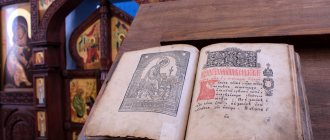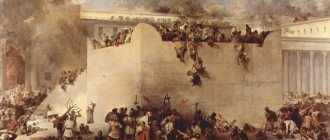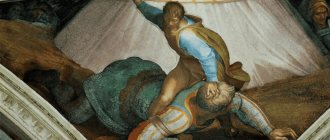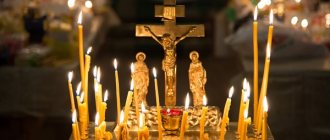There is no person in the world who has not encountered an enemy, insult, or slander at least once in his life. Some begin at this moment to make plans for revenge, others turn to God, giving all revenge to the judgment of the Creator. This is what King David did when they were persecuting him and trying to kill him.
During the period of exile and persecution by Saul, David, a man after God's own heart, wrote Psalm 108, “Vengeance on Enemies,” in which he expressed all his emotions towards the enemy. This petition sounds hopelessness and praise of God, helplessness and faith in the Coming One, thirst for revenge and mercy.
Psalm 108
“God of my praise! do not keep silent, for wicked lips and deceitful lips have been opened against me;
They speak to me with a lying tongue; they surround me with words of hatred from everywhere, they take up arms against me for no reason;
for my love they enmity me, but I pray; They repay me for good with evil, for my love with hatred. Place the wicked over him, and let the devil stand at his right hand. When he is put on trial, let him come out guilty, and let his prayer become a sin; may his days be short, and may another take his dignity; let his children be orphans, and his wife a widow; let his children wander and beg and ask for bread from their ruins; let the lender seize everything he has, and let strangers plunder his labor; let there be no one who sympathizes with him, let there be no one who has mercy on his orphans; let his descendants be destroyed, and let their name be blotted out in the next generation; let the iniquity of his fathers be remembered before the Lord, and let the sin of his mother not be blotted out; may they always be in the sight of the Lord, and may He destroy their memory on earth, because he did not think to show mercy, but pursued a poor and destitute and broken-hearted man in order to kill him; he loved the curse, it will come to him; did not want the blessing, it will move away from him; let him be clothed with the curse as with a robe, and let it enter like water into his bowels and like oil into his bones; let it be to him like a garment in which he dresses, and like a girdle with which he always girds himself. This is the reward from the Lord to my enemies and to those who speak evil against my soul!
But with me, Lord, Lord, do for the sake of Your name, for Your mercy is good; save me, for I am poor and needy, and my heart is wounded within me.
I disappear like a retreating shadow; they drive me away like a locust. My knees are weak from fasting, and my body has lost its fatness. I have become a laughing stock for them: when they see me, they nod their heads. Help me, O Lord, my God, save me by Thy mercy, that they may know that it is Thy hand, and that Thou, O Lord, did this. They curse, but You bless; they rebel, but let them be put to shame; Let Your servant rejoice. May my opponents be clothed with dishonor and covered with their shame like a garment. And I will loudly praise the Lord with my mouth and glorify Him among the multitude, for He stands at the right hand of the poor to save him from those who judge his soul.”
Interpretation of Psalm 148 by Theodoret of Cyrus
The interpretation of sacred books was carried out by saints from different eras. That is why in Orthodoxy the Holy Scriptures (the Bible, Psalms, Gospels, etc.) are revered along with patristic traditions (interpretations). One of the earliest interpretations of the Psalter was compiled by Bishop Theodoret of Cyrus of Antioch (393-457 AD). The theologian explains each verse of the psalm.
Hallelujah
An appeal to greater zeal of the soul to sing songs to the Creator. The exclamation, which in this context can be translated as “All together!”
1 Praise the Lord from heaven, praise him in the highest.
Moses teaches that the Lord created two heavens. One along with the Earth, he commanded the other to be among the waters and called it the firmament. David calls upon the Lord to sing songs from heaven and on high, that is, to the disembodied faces that dwell in both heavens. The prophet calls on the angels to join in singing and praise the Lord with him.
2 Praise him, all his angels: praise him, all his might.
Now the prophet turns to certain angelic ranks: Power and Strength, because they are mighty in strength, doing His word (Ps. 103:20).
3 Praise Him, O sun and moon; Praise Him, all you stars of light.
Theodoret of Cyrus cites the previous description of Symmachus: praise all the stars of light, but in the translation of the Seventy it turns out differently. God created light on the first day, and the heavenly bodies on the fourth. That is why the prophet David mentioned the light separately and calls upon the sun, moons and stars additionally, addressing them as animate and verbal creations. At the same time, he addresses people, urging them to look at the heavenly bodies as creations of God’s wisdom and to tirelessly praise the Lord.
4 Praise Him, the heavens of heavens: and the waters are above the heavens.
God divided the watery nature into the firmament and commanded the solar fire to move through the hardened waters. This way the fire does not go out and the hardened water does not evaporate. King David refers to heaven in the plural, according to the rules of the Hebrew language, according to which the word heaven is not used in the singular.
5 Let them praise the name of the Lord, for He commanded, and they were created;
David says that it is worthy to glorify the Creator, who created with the Word and created in the beauty that we see.
6 He established them forever and ever; gave a statute that will not pass away.
And he not only created, but also continues to think about creation, due to which all creatures, animate and inanimate, continue to exist as long as He pleases. And everyone fulfills His laws: the sea does not overflow its banks, day and night follow each other. Only people neglect God's laws.
7 Praise the Lord from the earth, you great fish and all the deeps,
By great fish we mean whales that live in the seas - parts of the earth. Great is the wisdom of the Creator, who imprisoned huge animals in the seas, showing their power, but protecting people from them so that they would not be harmed.
8 Fire and hail, snow and fog, a stormy wind that fulfills His word,
Fire can appear not only on the ground, but also form in the air in the form of lightning and fireballs. Snow, hail and fog come from water; storms, which David calls a stormy spirit, also refer to atmospheric phenomena due to the difference in pressure and humidity. Such phenomena obey God, but do not behave like something animate and intelligent.
9 the mountains and all the hills, the fruit trees and all the cedars,
Thank you to the Lord not so much from amazement at the greatness of His creatures, but also from the benefits to man - extensive and varied.
10 beasts and all livestock, creeping things and winged birds,
David separates the fierce beasts from the meek, but encourages both to praise the Lord, because there is not a single creature that is useless or superfluous, although this is hidden from our knowledge.
11 The kings of the earth and all the nations, the princes and all the judges of the earth,
The prophet calls on kings, nations, princes and judges to glorify the Lord.
12 youths and maidens, elders and youths
May immature and overripe age also praise the Lord.
13 Let them praise the name of the Lord, for His alone is exalted, His glory is on earth and in heaven.
They praise the name of the Lord, because the memory of other false gods has faded, and the only One who exists will not pass through the centuries, not only in heaven, but also on earth.
14 He has exalted the horn of His people, the glory of all His saints, the children of Israel, the people who are close to Him.
The Lord will exalt the people who honor Him. A horn is a fortress; King David refers to the likeness of animals armed with horns. God will make this people not only strong, but also revered. The Lord will give glory to the children of Israel and the people close to Him. Further, Theodoret of Cyrus writes that the celebrity passed with piety, and the Israelites lost that glory, but the pagans will receive the gifts of God. The theologian foresaw the spread of the Orthodox faith throughout the world, and people who were pagans in the 4th century would become pious Christians.
The history of writing the psalm “Vengeance on Enemies”
During the time of King David, there were constant wars, killing an enemy was considered valor, and no one talked about loving one’s neighbor. David knew and heard God, so he asked the Almighty to punish the enemies who were seeking his death.
Additional articles:
- Life of King and Prophet David
- Prayer to King David
The basis of David's prayer was the list of curses that are given in Deuteronomy, in chapter 28.
David was ordained king as a simple sheep shepherd boy who defeated the giant Goliath by faith in the power of Almighty God. Saul, fascinated by David's divine playing of musical instruments, during which all evil forces abandoned the Israeli king, made the shepherd boy his warrior. The meek and faithful young man aroused the envy of Saul; he repeatedly wanted to kill David, but the Lord protected him.
As you read Harsh Canto 108, you should know that David had two opportunities to kill Saul, but he did not raise his hand against the king.
The “hero” of the appeal could also be Doik, a Jew who betrayed David and 300 priests, who were executed.
David in front of sleeping Saul
Curse or prophecy?
Despite all the evil that the king or the senior shepherd Doik tried to inflict on David, the author of the “evil” psalm never raised a hand against them. Meanwhile, David was given the opportunity to kill the same Saul at least twice. The Orthodox information portal “Vera” also reminds us of this. In addition, according to Abbot Nikon (Golovko) (site “The Law of God”), the curses listed in the psalm do not apply to people at all, but to demons.
According to the majority of clergy, Psalm 108 should not be interpreted at all as a prayer for the punishment of enemies. The lyrics of the song do not contain a list of desired suffering for enemies, but prophecies. Thus, Saint Athanasius the Great points out that the particle “yes” must be mentally replaced with the verb “will become” (“will be”), and then the true meaning of David’s song will be revealed to the believer.
To whom did David predict such an unenviable fate? As John Chrysostom wrote, the content of Psalm 108 refers to the fate of the traitor Judas, as well as to the lives of other people who rebel against the priests using deceit and lies. For example, the days of Judas really turned out to be short: after all, everyone knows that, according to scripture, a disciple of Jesus hanged himself. As for the wife and children mentioned in the psalm, Athanasius the Great said that a widowed wife should be understood as a soul that rejected Christ, and orphans are thoughts that have lost Divine grace.
Prophetic meaning of Psalm 108
David's psalm is filled with prophecies.
If we look at him from the perspective of centuries, then in the man of God himself we easily find a prototype of Jesus, who was betrayed by Judas, like David Doikom. Rivers of blood flowed during the execution of 300 priests, and in the days of early Christianity, bloody reprisals awaited the followers of Christ.
The words of the prophecy about the whole people came true: “Let his sons be orphans, and his wife a widow,” when in 63, after the uprising of the Jews, the Romans killed men, and drove women and children out of their homes, condemning them to starvation.
David foresaw the disasters that awaited the Jews. “Let his father’s iniquity be remembered before the Lord, and let his mother’s sin not be purged.” The father is the people who sinned in the desert, the mother is the Jews who crucified Jesus Christ.
Seeing the cruel words of the prophetic message, some evil people rub their hands with joy that they will punish the offenders with God's powers, while forgetting about the allegorical meaning of David's prayer and his prophetic power.
Not many people who demand punishment for offenders, seeing the title “Vengeance on Enemies,” try to find out how to read and understand Psalm 108.
Psalms of David, Bible
Psalm 63: text of prayer in Russian
Unfortunately, every person experiences unpleasant situations in life associated with slander and betrayal. Even kings are no exception. For example, during the preparation of the rebellion, David’s enemies used any methods against the beloved king of the people. David tells the Lord about this in Psalm 63
David pays special attention to the slander that was used against him
In Church Slavonic
Finally, a psalm to David
1 Hear, O God, my voice, always pray to You, take away my soul from the fear of the enemy.
2 Cover me from the multitude of evildoers, from the multitude of those who practice iniquity.
3 He who has slashed his tongues like a sword, has flexed his bow, a bitter thing,
4 They will shoot at the secret one who is blameless; they will suddenly shoot him and will not be afraid.
5 Having confirmed to yourself the evil word, you have told to hide the snare, deciding: who will see them?
6 Having experienced iniquity, having passed away those who try trials, man will come, and the heart is deep,
7 and God will be exalted. The infant's arrows caused their wounds,
8 And their nations fainted against them. Everyone who saw them was confused,
9 And every man feared, and declared the works of God, and understood His works.
10 The righteous will rejoice in the Lord and trust in Him, and all who are upright in heart will boast.
In Russian
For fulfillment, a psalm of David.
1 Hear, O God, my voice when I pray to You, deliver my soul from the fear of the enemy,
2Hide me from the multitude of those who do evil, from the multitude of those who do injustice,
3 who have sharpened their tongues like a sword, who have drawn their bow to do cruel things,
4 to shoot secretly at the blameless: they will strike him suddenly and will not be afraid.
We recommend studying Psalm 50
5 They strengthened themselves in evil intentions, conspired to secretly lay snares, and said: “Who will see them?”
7 and God will be exalted. Their blows became like the arrows of infants,
8 And their tongues fainted, and all who saw them were troubled.
9 And every man feared, and the works of God were declared, and his works they understood.
10 The righteous will rejoice in the Lord and trust in Him, and all the upright in heart will boast.
History of writing
The text of Psalm 63 can be considered to have been written at the beginning of Absalom's revolt before his flight from Jerusalem. Since it was impossible to do anything against King David, slander was used. Although the intentions of the traitors were clear and firm, lies about the king were spread hidden. Enemies attributed non-existent atrocities to David and denigrated his methods of government.
Why read Psalm 63?
The text of Psalm 63 tells about the troubles that everyone encountered along the way - about betrayal and slander. It is in such moments of despair that one wants to believe that a lie against an innocent person will turn against the slanderer, that the truth will sooner or later triumph.
During the most difficult doubts and worries that you have been slandered, it is recommended to read Psalm 63. According to the rules of the psalm, it is read in Old Church Slavonic. But since the main task of the psalm is to support a person in difficult times, you can read Psalm 63 in Russian.
Interpretation
- The psalm begins with a prayer. Outraged and amazed by the methods of his enemies, David turns to the Lord to save his soul.
- Verse 2-4. David in prayer tells God about the danger that threatens him. He says that he is afraid of his enemies and speaks about fear openly, because he knows that his destiny is to serve the Lord and his generation. That he is right, and evil tongues want to denigrate him. He asks for protection not only from death, but also from fear. David tells the Lord about how cunning his enemies are, about their great depravity and deceit. The fact that enemies are uniting against him, supporting each other, hoping that the more dirt they pour on a person, the more it will stick to him.
- Verse 5-6. The traitors of David, in their atheism, are confident in their impunity, confident that God does not see them. They consult each other on how they can commit greater evil with greater success. In the policy pursued by the king, the traitors are looking for flaws, trying to find at least something suitable for further discrediting David and his personal life.
- Verse 7-10. These verses speak of the consequences that will surely befall his enemies. They may approve of themselves in their wickedness, but God sees everything. And if traitors can only annoy both David and all people with evil tongues, then the all-seeing Lord hits right on target. That eyewitnesses will revere the Lord. And reflect on your actions, but reflect wisely. That pious people will be happy with justice done. This will encourage their faith and bring absolute clarity to their heads.
(1 5.00 out of 5) Loading...
When should you turn to Psalm 109?
Every day some kind of trouble awaits us, be it a quarrel with loved ones or rudeness in public places, not to mention hostile relationships. The indignant soul thirsts for vengeance, then Christians seize on the song of Vengeance.
Every word blessed by God has power. You should correctly understand the meaning of David’s prayer so as not to incur all the curses that will be pronounced in prayer.
A person tests himself, bearing responsibility for the spoken words of curses. The degree of guilt of the sinner should be clearly understood.
All judgment is given to God, reading Psalm 108, if the sinner:
- blasphemes;
- does not agree to any reconciliation;
- does not accept the priest's admonitions.
Attention! When starting to read a psalm, directing its effect on a specific person, see if you are making a vain accusation. Perhaps your offense is too petty to turn to the Almighty, so as not to reap what was said in your life.
Reading rules
The first thing to do before reading Psalm 108 is to calm down. On this occasion you can read the Lord's Prayer. Only in the world can one evaluate whether a person deserves the curses that will be reserved for him. It is important to understand that only God will decide whether the enemy deserves punishment and, if he is innocent, all horrors will return to the one who sent them.
Psalm 108 can be found in a prayer book, since it does no harm: by reading it, a person pronounces a sentence on God, and does not fulfill it himself. However, this text should not be consulted on Sundays or Christian holidays.










